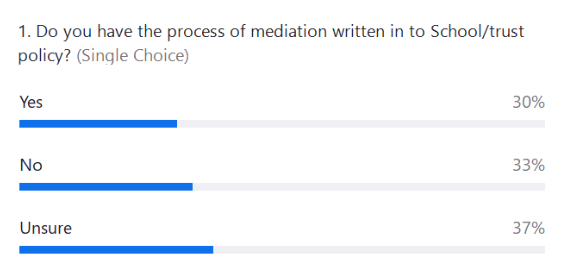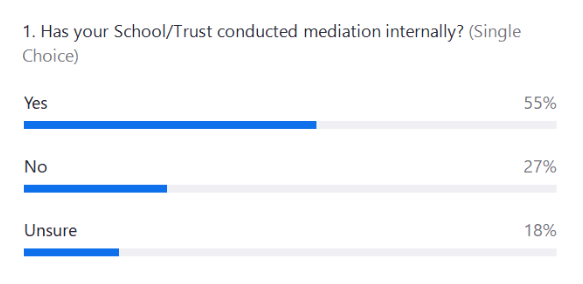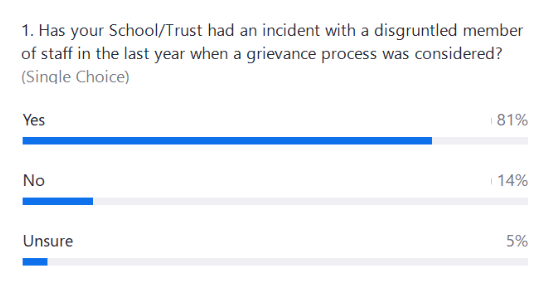Employment Law: Employee vs Employee – Unlocking the Power of Mediation

This summary is based on Judicium’s Employment Law ‘Sofa Session’ from the 17th of April, with our resident expert Paul Luffman, LLB (Hons), L.P.C. This session focused on why grievances were never intended to resolve disputes between colleagues (and therefore why they simply don’t work); how mediation can be used as a better solution to these problems; and why mediation is the most cost effective and successful approach in the long run.
Poll 1
Why the grievance process won’t work.
Typically, when employees are in conflict with each other, they tend to use the grievance procedure as a means to resolve their issues, which results in a grievance and counter grievance.
However, this is where mediation can replace the need for grievances. The grievance process is designed for an employee to raise concerns about their conditions of employment with their employer - not as a way to resolve disputes between employees.
Therefore, we suggest mediation is built into grievance procedures at the informal stage as an alternative means of resolution, but also at every stage of the process as a potential suggested grievance outcome.
Ultimately, the cost of early intervention through mediation will far outweigh the total cost of management time and lost productivity and engagement of employees who use the grievance process to attempt to resolve disputes.
Poll 2

What is mediation?
Mediation is where an impartial third party, the mediator, helps two or more people in dispute to attempt to reach an agreement. Any agreement comes from those in dispute, not from the mediator.
The mediator is not there to judge, to say one person is right and the other wrong, or to tell those involved in the mediation what they should do. The mediator oversees the process of seeking to resolve the problem, but not the outcome.
Mediation distinguishes itself from other approaches to conflict resolution, such as grievance procedures and the employment tribunal process, in a number of ways.
Mediation is:- less formal
- flexible
- voluntary
- morally binding, but normally has no legal status
- confidential
- (generally) unaccompanied
- owned by the parties
The mediator will agree with everyone involved what information can be shared outside the mediation and how. If you do not reach an agreement, anything that’s been said during the mediation must be kept confidential and cannot be used in future procedures.
It is used to resolve disagreements around workplace relationships rather than other disputes, such as pay, or issues related to dismissal or conduct.
You can use mediation to resolve:- bullying and harassment
- communication problems
- personality clashes
- relationship breakdowns
It’s a good idea to try and resolve the problem informally first using mediation. However, if you don’t use mediation at this stage, it can be used at any stage in a disagreement, but it’s best to start it as soon as possible. NB: The earlier the disagreement is dealt with, the less chance there is of things escalating.
You could also use mediation to rebuild relationships after a disciplinary or grievance process where relationships need repair.
Mediation is best done face to face, in person and allow at least a day for the process to take place.
Judicium offer a Mediation service, and our Mediators are ACAS trained. They can work individually or in pairs as co-mediators.
What is the mediation process?
Workplace mediation process
This process helps to resolve workplace conflicts. Its effectiveness relies on several factors, which include the type of conflict, the magnitude of the issue and the type of individuals involved. Core principles and values, such as communication, trust, honesty, empathy and compromise, help to guide the mediation process. The steps below provide a summary to the mediation process:
1. Define the rules
To ensure a smooth and easy mediation process, define the terms of the mediation to the client and to all parties involved in the conflict. Meet the involved parties individually and explain the rules guiding the mediation to let them know what to expect. Their responses can indicate if they want to participate and if they do not, then mediation should not be offered. If the parties do wish to participate, explain to everyone involved that the process isn't a disciplinary action and is completely voluntary. Some useful rules are: agreeing not to interrupt, listening actively, remaining truthful and being open-minded.
Setting these rules helps those involved develop trust in the process, allowing them to feel safe and open to express themselves honestly.
2. Meet the conflicting parties separately
Invite each party separately to a meeting and listen to their perspectives. Active listening and open-ended questions are important as well as rephrasing their statements and repeating them back to ensure understanding. It’s important to identify the cause of the conflict and consider each person's body language. Strong emotions may be expressed.
The purpose of this stage is to hear each party's side and to explain to them that it's not about one person winning, but arriving at a successful conclusion for everyone involved and promoting a healthy workplace.
3. Hold a joint meeting
After meeting both parties separately, hold a joint meeting. The arrangement of the room is important and must allow the mediator to effectively manage the conversation at all times. Restate the rules and strictly enforce them. Detail the issues one at a time, allowing the individuals to express their feelings whilst the other person listens. If the conversation becomes unproductive, the mediator must bring the discussion back to the main point and to an area where there was agreement in order to build consensus. The mediator should encourage the individuals to consider the other person's situation and show empathy by asking each other questions through the mediator which may help them to understand the other person's point of view. They can also describe what they want the other party to do to resolve the conflict.
4. Reach an agreement/compromise
This stage encourages both parties to reach an agreement through negotiation they must arrive at by themselves, so it is completely owned by them. The mediator may ask them to focus on the future and the possibilities for a solution. It helps to review the points brought up during the discussion, focusing on the areas of agreement to build a positive atmosphere. Then the mediator will move on to review the areas in which there are disagreements and allow them to present ideas for possible solutions. If someone rejects a suggestion because it's not in their favour, the mediator will ask them what a reasonable solution is for them and help the two parties to reach an agreement.
5. Develop a written agreement
The mediator should record all the solutions jointly raised and agreed upon, ensuring they're simple, easy to understand and that the actions to take afterwards are practicable with set timeframes. The mediator will outline the agreement to the parties involved, ensure they understand it and plan to abide by it. If there are points of clarification, go through them again. The mediator must ensure both parties want to commit to the terms and conditions reached and asks them to sign the written agreement, which helps solidify accountability.
NB: Ensure NeutralityThe mediator must always remain neutral and unbiased, which is why it is impossible to mediate internally. The mediator must avoid any form of favouritism and treat everyone equally and fairly to prevent the conflict from escalating. This can lead to some people feeling unsupported during the process, but it is vitally important to maintain integrity in the mediation process.
Poll 3

Scenarios
1. Disagreement over a task
Small-level disagreements frequently happen in the workplace. These task-based disagreements are a natural part of working life, from a singular dispute in a meeting to a difference of opinion on a particular topic.
Conflict: In a team meeting discussing strategy direction, two colleagues disagree about which is the best route. The discussion becomes heated, and both people feel frustrated and then submit grievances against each other.
Mediation is considered as a way of finding a resolution that encompasses both of their points.
2. Experiencing creative differences
Strong creative opinions can cause conflicting voices, each envisioning different strategic directions.
Conflict: A small project team of SLT members are put together to project manage a refurbishment of a school building. There is a discussion on the interior design elements, such as the final build's colour schemes and furniture. One SLT member is worried about the overall aesthetic appeal for the students, whilst another SLT member only seems to care about functionality. They both feel like the other person is dismissing their ideas without considering them, and it's causing friction between them. This makes the other members of the project team feel uncomfortable and causes a delay due to an inability of either party to budge.
Mediation is considered to unblock the impasse and to improve the working environment of the team.
3. Interpersonal conflicts
Many professionals have found someone challenging to work with or encountered a colleague they disliked. Typically, having interpersonal skills like communication, attention to detail and active listening can help teammates resolve conflict. However, if an employee lacks these, it can exacerbate the situation. Sometimes it escalates beyond the one-off disagreements and requires professional mediation.
Conflict: A TA loves working with everyone else on their team, but there is a team member they have conflict with regularly. They simply have opposing views and when they are working together each day it introduces the problems over and over again. Their working relationship is beginning to affect their performance and that of their colleagues.
Mediation is considered as an alternative to the performance management process.
4. Different styles of working
Consider people’s preferences for different work styles. Everyone has their methods for completing work, from how they manage their time to their approach to tasks. When people work closely with others, these individual differences can cause conflict.
Conflict: Two colleagues have been asked to work together on producing a new staff policy. Unfortunately, their different working styles cause conflict between them. While one person prefers group work, the other person prefers to work by themselves. One person likes working to a tight deadline, whereas the other person prefers to get things done ahead of time. They are spending more and more time arguing about how to write the policy rather than writing the document.
Mediation is considered as an option to repair the working relationship and get the policy development back on track.
5. Different behavioural styles
An individual's behavioural style refers to how they respond to various situations. It is defined by a pattern of observable habits and behaviours that demonstrate how an individual might approach a problem or task. These styles can inform how people find motivation, relate to others in the workplace, and communicate their needs, but also can lead to conflict.
Conflict: Two colleagues who work in the same team have completely different behavioural styles and it has led to conflict between them where neither person speaks to the other. They have started to speak about each other to colleagues. One person is tactile and loves hugging people while the other person likes their own personal space and does not like to be touched or for people to invade their own personal space. The tactile person feels the other person is standoffish and aloof whilst the person who likes their own space considers the tactile person to be unprofessional, too familiar and a gossip. They actively avoid each other and are refusing to work together.
Mediation is considered as an alternative way to reinforce professional working standards with agreement.
Additional Info
For more information on Judicium’s Employment Law Advisory Service please visit: https://www.judiciumeducation.co.uk/hr-advisory-service
If you require any support in any of these steps or would like to talk to someone surrounding some support for your school, please do not hesitate to call us on 0345 548 7000 or email georgina.decostajudicium.com.
If you’d like to review Judicium’s forthcoming sofa sessions, please click here.
Follow us on X: @JudiciumEDU
Upcoming Training
As mentioned in the sessions our Employment Law and HR Team have the following sessions coming up which may be of interest:
CPD Accredited Courses:
Managing Capability with the Education Sector – Thursday 25th April 2024 at 9.30am – 1.00pm
Changing Terms and Conditions of Employment – Thursday 9th May 2024 9:30am – 12:30pm
Managing Short Term Sickness Absence – Tuesday 21st May 2024 at 9.30am – 12.30pm
© This content is the exclusive property of Judicium Education. The works are intended to provide an overview of the sofa session you attend and/or to be a learning aid to assist you and your school. However, any redistribution or reproduction of part or all of the contents in any form is prohibited. You may not, except with our express written permission, distribute or exploit the content. Failure to follow this guidance may result in Judicium either preventing you with access to our sessions and/or follow up content.
Related content
(4).png)
The latest ERA implementation explains the imminent changes to trade union legislation, and several things that schools, trusts and colleges should do now to prepare.
.png)
On Tuesday 16th December 2025, the Employment Rights Bill was finally passed in Parliament and today, it has received Royal Assent! It is now the Employment Rights Act 2025.
(1).png)
On 27 November 2025, the UK government altered a flagship commitment in the Employment Rights Bill and dropped plans to grant most workers protection from unfair dismissal from their first day of employment. Instead, the Bill will now grant unfair-dismissal rights after six months of continuous service. Read this blog to uncover the reasons why, what this means for schools and how we can help.
(2).png)
In this post, we look at the four ERB Consultations that have been launched by the government and set out links to the consultations so that you can have your say.
.png)
Whats New | Sofa Sessions | HR
In this blog, we'll share the summary notes from our HR and Employment Law Sofa Session from the 19th November, delivered by our resident expert, Kirstie Young.
.png)
In this blog, we will explore the significance of enhancing performance and best practice in education and how it can be implemented effectively.


Whats New | HR